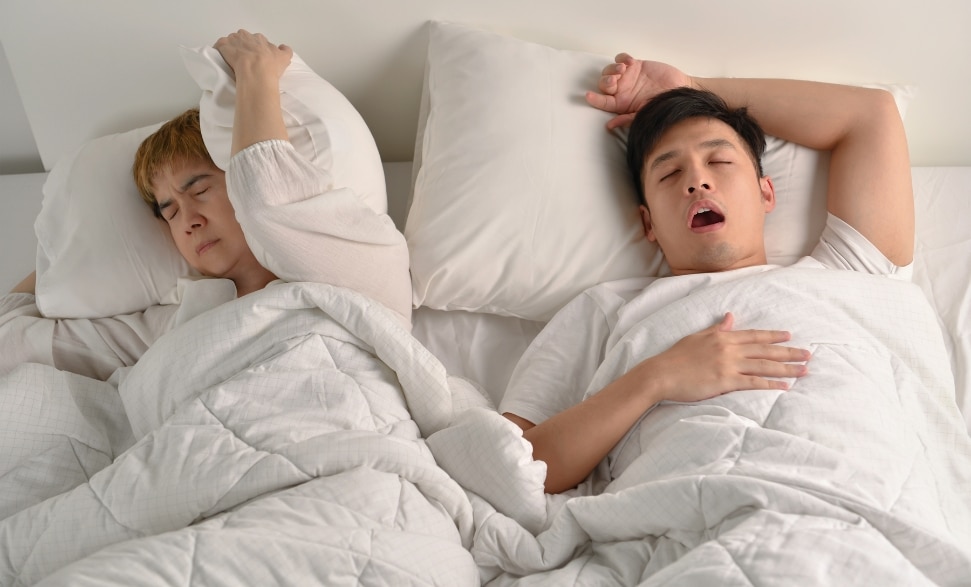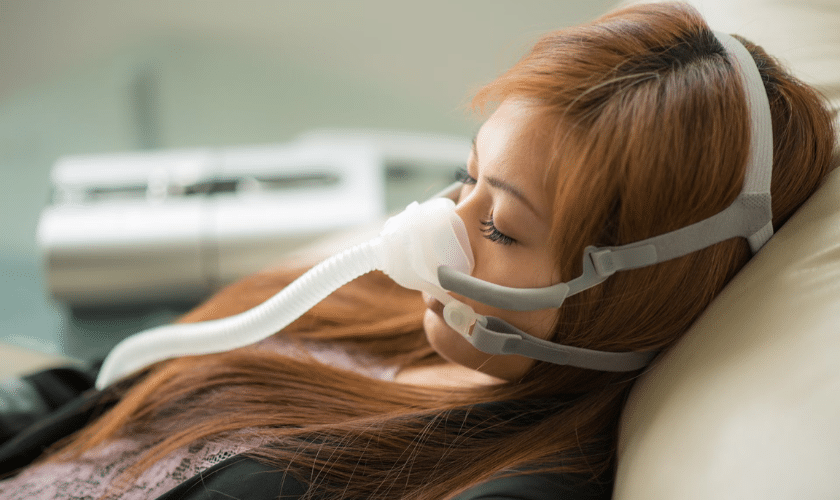The Link Between Sleep Apnea And Chronic Fatigue: What You Need To Know

Do you find yourself waking up tired, no matter how long you’ve slept? Are your energy levels constantly depleted, leaving you feeling drained and unable to enjoy life to the fullest? If so, you may be one of the millions of people suffering from a common yet often undiagnosed sleep disorder called sleep apnea.
While many are familiar with the term sleep apnea, few truly understand its profound impact on overall health and well-being. In this blog post, we will delve into the link between sleep apnea and chronic fatigue, shedding light on why it’s crucial to address this silent saboteur before it takes a toll on your quality of life.
So grab a cup of coffee (or perhaps skip it if caffeine exacerbates your symptoms!) and join us as we uncover the hidden connection between sleep apnea and chronic fatigue. It’s time to reclaim your energy and vitality!
Sleep Apnea Overview
Here are the key points for the section on Sleep Apnea: Causes, Symptoms, and Effects:
1. Causes of Sleep Apnea: Sleep apnea is a common sleep disorder that affects millions of people worldwide. But what exactly causes this condition? Well, there isn’t one single cause of sleep apnea. Rather, it can be attributed to a combination of factors.
2. Common Symptoms: Sleep apnea is a sleep disorder that can have a significant impact on your overall well-being. It is characterized by pauses in breathing during sleep, which can occur multiple times throughout the night. These interruptions in breathing can lead to a range of symptoms that affect both your physical and mental health.
3. Effects on Health: Sleep apnea is a sleep disorder that can have significant effects on overall health. When left untreated, it can lead to a range of health complications and impact various aspects of daily life.
4. Contributing Factors: When it comes to sleep apnea, there are several factors that can contribute to its development and severity. One major factor is obesity. Excess weight puts pressure on the airways, making them more likely to collapse during sleep. In fact, studies have shown that even a small reduction in weight can lead to significant improvements in sleep apnea symptoms.
Chronic Fatigue: Understanding the Impact
1. Chronic Fatigue Syndrome (CFS): Living with chronic fatigue can be incredibly challenging, affecting every aspect of daily life. The constant exhaustion and lack of energy make even simple tasks feel overwhelming. It’s not just feeling tired; it goes much deeper than that.
People with chronic fatigue syndrome (CFS) often experience a range of symptoms including persistent fatigue, muscle pain, headaches, and difficulty concentrating. These symptoms can make it difficult to work or participate in social activities, leading to feelings of isolation and frustration.
2. Impact on Daily Life: Living with chronic fatigue syndrome (CFS) can have a significant impact on daily life. The overwhelming exhaustion and lack of energy often make it difficult to perform even simple tasks. Fatigue may persist for several months or longer, leaving individuals feeling constantly drained and unable to fully engage in their usual activities.
One major challenge faced by those with CFS is the unpredictability of symptoms. On some days, they may wake up feeling slightly better only to be hit by a wave of exhaustion later in the day. This inconsistency can make it challenging to plan ahead or maintain a regular routine.
3. Possible Overlap with Sleep Apnea: Sleep apnea and chronic fatigue syndrome (CFS) are two distinct conditions, but there is evidence suggesting a potential overlap between the two. While research is ongoing, it’s important to explore this connection for a better understanding of both disorders.
4. Multifactorial Causes: Sleep apnea and chronic fatigue are complex conditions that can arise from a combination of factors. While the exact causes may vary from individual to individual, there are several common factors that contribute to their development.
Obesity is often associated with both sleep apnea and chronic fatigue. Excess weight can put pressure on the airways, leading to obstruction during sleep and disrupted breathing patterns. Additionally, carrying extra weight can also lead to feelings of fatigue and decreased energy levels throughout the day.
Exploring the Connection
Understanding the link between sleep apnea and chronic fatigue is crucial for managing both conditions effectively. While they may seem unrelated at first glance, a closer look reveals some intriguing connections. Let’s dive deeper into this complex relationship.
1. Shared Symptoms and Overlapping Effects: Both sleep apnea and chronic fatigue share common symptoms such as excessive daytime sleepiness, cognitive impairment, and mood disturbances. These overlapping effects can make it challenging to differentiate between the two conditions without proper evaluation.
2. Sleep Quality and CFS: Sleep disruptions caused by sleep apnea can significantly impact overall sleep quality, leading to persistent fatigue during the day. Chronic fatigue syndrome (CFS) sufferers also experience debilitating exhaustion that is not relieved by restful sleep alone.
3. Underlying Mechanisms: Research suggests that both sleep apnea and CFS involve dysregulation of various physiological processes, including inflammation, oxidative stress, and neurotransmitter imbalances. Understanding these underlying mechanisms can provide valuable insights into potential treatment approaches.
By exploring these connections in more detail, healthcare professionals can develop personalized treatment plans that address both conditions simultaneously.
Treatment Approaches
When it comes to addressing sleep apnea and chronic fatigue, a comprehensive treatment approach is crucial. By targeting both conditions simultaneously, individuals can experience improved sleep quality and reduce the impact of chronic fatigue on their daily lives.
1. Sleep Apnea Treatment: The first step in managing sleep apnea involves treating its underlying cause. For obstructive sleep apnea (OSA), continuous positive airway pressure (CPAP) therapy is often recommended. This involves wearing a mask that delivers pressurized air to keep the airways open during sleep. Other options include dental appliances, positional therapy, or surgery for severe cases.
2. Chronic Fatigue Management: Managing chronic fatigue requires a multifaceted approach. Lifestyle modifications such as maintaining a balanced diet and staying hydrated can help boost energy levels. Regular physical activity has also been shown to improve symptoms of chronic fatigue by increasing stamina and reducing feelings of tiredness.
3. Integrated Approach: In some cases, an integrated approach may be necessary to address both sleep apnea and chronic fatigue effectively. This could involve working with a team of healthcare professionals who specialize in sleep medicine, psychology, nutrition, and physical therapy to create an individualized treatment plan tailored to each person’s specific needs.
By combining various treatment modalities and taking into account the unique factors contributing to each individual’s condition, it becomes possible to find relief from both sleep apnea symptoms and chronic fatigue.
Seeking Professional Help
1. Sleep Medicine Specialists: Sleep apnea is a complex sleep disorder that requires specialized medical attention. Sleep medicine specialists are healthcare professionals who specialize in diagnosing and treating sleep disorders, including sleep apnea. These experts have extensive knowledge and experience in understanding the intricacies of sleep patterns and identifying the underlying causes of disrupted breathing during sleep.
2. Collaborative Healthcare Team: When it comes to managing sleep apnea and chronic fatigue, a collaborative healthcare team can make all the difference. This team consists of various professionals with expertise in different areas, working together to provide comprehensive care and support.
3. Personalized Treatment Plans: When it comes to addressing sleep apnea and chronic fatigue, one size does not fit all. Each individual’s experience with these conditions is unique, requiring personalized treatment plans tailored to their specific needs.
Lifestyle Modifications for Better Sleep
Establishing a Consistent Sleep Schedule: One of the key factors in improving sleep quality is maintaining a consistent sleep schedule. Going to bed and waking up at the same time each day helps regulate your body’s internal clock, promoting better sleep patterns. Aim for seven to eight hours of uninterrupted sleep every night.
Creating a Relaxing Bedtime Routine: Developing a relaxing bedtime routine can signal to your brain that it’s time to unwind and prepare for sleep. Engage in activities such as reading, taking a warm bath, or practicing gentle stretching or meditation. Avoid stimulating activities like watching TV or using electronic devices close to bedtime.
Creating a Comfortable Sleep Environment: Your sleep environment plays an important role in promoting restful slumber. Ensure your bedroom is cool, dark, and quiet. Invest in comfortable bedding and pillows that support your preferred sleeping position. Consider using white noise machines or earplugs if external noises disrupt your sleep.
Balanced Diet and Hydration: Maintaining a balanced diet can positively impact both overall health and quality of sleep. Limit caffeine intake later in the day as it may interfere with falling asleep easily. Additionally, avoid heavy meals close to bedtime which can cause discomfort during the night.
Regular Physical Activity: Engaging in regular physical activity not only improves overall well-being but also promotes better sleep quality. Incorporate moderate exercise into your daily routine, such as brisk walking or cycling.
Stress Management and Relaxation Techniques: High levels of stress can significantly impact our ability to fall asleep and stay asleep throughout the night. Implement stress management techniques such as deep breathing exercises, mindfulness meditation, or journaling before bed to help calm the mind and promote relaxation.
By adopting these lifestyle modifications tailored towards improving your quality of sleep you may find yourself waking up feeling refreshed and energized each morning! Remember though – everyone’s journey towards better-quality snoozes is unique, so it’s essential to find what works best for you. Don’t hesitate
It is clear that there is a strong link between sleep apnea and chronic fatigue. Sleep apnea can greatly impact the quality of one’s sleep, leading to daytime tiredness and exhaustion. This chronic fatigue can have a significant effect on daily life, making even simple tasks feel overwhelming.
While the exact connection between sleep apnea and chronic fatigue syndrome (CFS) is still being studied, there are several factors that suggest an overlap between these two conditions. Shared symptoms and overlapping effects point to a potential relationship, while disrupted sleep patterns may contribute to the development or exacerbation of CFS.
Understanding this connection is crucial in finding effective treatment approaches. Managing sleep apnea through treatments such as continuous positive airway pressure (CPAP) therapy can improve sleep quality and alleviate some of the associated fatigue. Additionally, adopting lifestyle modifications like establishing consistent sleep schedules and creating relaxing bedtime routines can also promote better rest.
Source: CNN
For individuals experiencing chronic fatigue from both sleep apnea and CFS, an integrated approach involving collaboration among healthcare professionals may be necessary. Working with specialists in both fields can help develop personalized treatment plans tailored to address each individual’s unique needs.
It is important for those struggling with excessive daytime tiredness or unexplained exhaustion to seek professional help. Consulting with sleep medicine specialists or other healthcare professionals experienced in treating both conditions will provide guidance on proper diagnosis and appropriate management strategies.
By implementing lifestyle modifications for better sleep hygiene alongside managing chronic fatigue through balanced diets, regular physical activity, and stress management techniques, individuals can strive towards improved overall well-being.
Remember that finding relief from chronic fatigue requires patience and persistence. However, by addressing both underlying causes – namely addressing any underlying issues related to sleep apnea while simultaneously managing CFS symptoms – individuals may experience significant improvement in their energy levels and overall quality of life.



